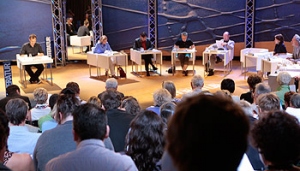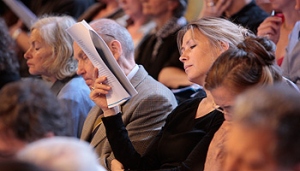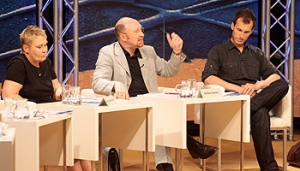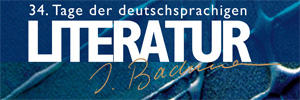 Christopher Kloeble (D)
Christopher Kloeble (D)
Christopher Kloeble (G)
Christopher Kloeble was the last author to read on the first morning of the readings. His excerpt from the novel “Ein versteckter Mensch” [a hidden person] is about an unusual father-son relationship.
Son finds out that his father will die
The father, Fred, is impaired in a way that’s not described in any detail; the son has just finished secondary school and now finds out that his father will die of an illness that’s not described in any detail.
Author portrait
Reading
Discussion
“Son does not muster sensitivity”
Hubert Winkels could not find anything positive about the text and saw it as being on a “sloping path” because father and son were not able to create even “a minimal basis of communication”. “It almost hurts that the son, Albert, is not even able to muster such minimal sensitivity as to cherish what is important to the father, which isn’t much, anyway. The text unrolls itself from the back.”
 Christoph Kloeble Lesung (Bild: Johannes Puch)
Christoph Kloeble Lesung (Bild: Johannes Puch)
“Text uses wrong images”
Meike Feßmann thought that Winkel’s evaluation of the constellation of characters was too strict. “I do think that the unequal father-son pair and the reversal of the auguries are the text’s strong points – but this also creates some laboriousness, because it has to be explained to the reader that things are reversed here.”
The text wants to be “casual and flowing” and “entertaining”, linguistically, but it often uses the wrong images. But she liked the basic constellation very much. When things become bizarre then, linguistically, they have to be extremely accurate, says Feßmann.
“Madness and dementia”
Paul Jandl thought: “Madness and dementia are particularly difficult to portray in literature – God knows why the Bachmann Prize is a catch basin for such texts.” The text immunises itself against criticism through its inherent “logic of dementia”; however, it is not plausible, neither from a human perspective nor linguistically. “The text evades criticism.”
 Publikum (Bild: Johannes Puch)
Publikum (Bild: Johannes Puch)
The right literary means
“What I found fascinating about this text is the reversal of the ordinary”, Alain Claude Sulzer qualified the rather harsh criticism of his colleagues. From the outset, the son has to look after his father. The situation could be called “implausible” if it hadn’t been solved using the right literary means, as is the case here.
“Text has comic potential”
“I believe that the text has comic potential, rather than realistic potential”, Karin Fleischanderl began. The criterion of everything having to be right psychologically thus misses the text. “The upside-down world is always a source of humour – and that’s why one comic scene follows another. I find that the text works quite well on this level.”
“Characters fight against the author”
“That’s like a high jumper saying: put it on 1.60 and have a look how elegantly I jump over it. There is a bit more in it”, says Burkhard Spinnen. This is the third Klagenfurt text to deal with a humanity topic.
We are dealing with an “experiment” of the kind “Let’s turn things round and see what happens”. “I was very interested in this when I read the previous texts – here I have the feeling that the characters are fighting against what the author is planning to do with them.”
At the end, Spinnen agreed with Hubert Winkels: “This is like an escape of the characters, as if Hamlet said: we don’t have to avenge our honour, let’s go to Fuerteventura for two weeks first.”
 Christopher Kloeble bei Jurydiskussion (Bild: Johannes Puch)
Christopher Kloeble bei Jurydiskussion (Bild: Johannes Puch)
Cryptic analysis by Sulzer
“Placed much too high“, Alain Claude Sulzer disagreed. This is about an “unheard-of constellation”, that he has never read about before in this way. “Which can be an argument in favour of finding such a short text interesting – or not, as the case may be”, was Sulzer’s cryptic closing remark.
Text works on several levels
Hildegard Elisabeth Keller then said: “This text, which works on several levels, aroused my interest very much.” The end especially, when the father attacks the son, again posed many questions. Overall, the constellation of characters is “interesting” and “worth acting out”.
“I am still asking myself the question, who is Fred?” She can’t quite place the father’s reading of encyclopaedias, which, as we know, is not easy. “Fred is a child, how can he read an encyclopaedia?”
Barbara Johanna Frank
 TDDl 2010
TDDl 2010